Ethical Issues in Nursing Practice
VerifiedAdded on 2020/10/22
|10
|2756
|441
AI Summary
This assignment provides a comprehensive overview of ethical issues in nursing practice, including the challenges of mental health care reform, professional standards for rehabilitation nursing, and dilemmas in diagnosing Alzheimer's disease. The essay concludes by outlining practices that will be incorporated by nurses to derive positive outcomes, complying with Australian nursing standards and code of ethics.
Contribute Materials
Your contribution can guide someone’s learning journey. Share your
documents today.

HEALTH
Secure Best Marks with AI Grader
Need help grading? Try our AI Grader for instant feedback on your assignments.
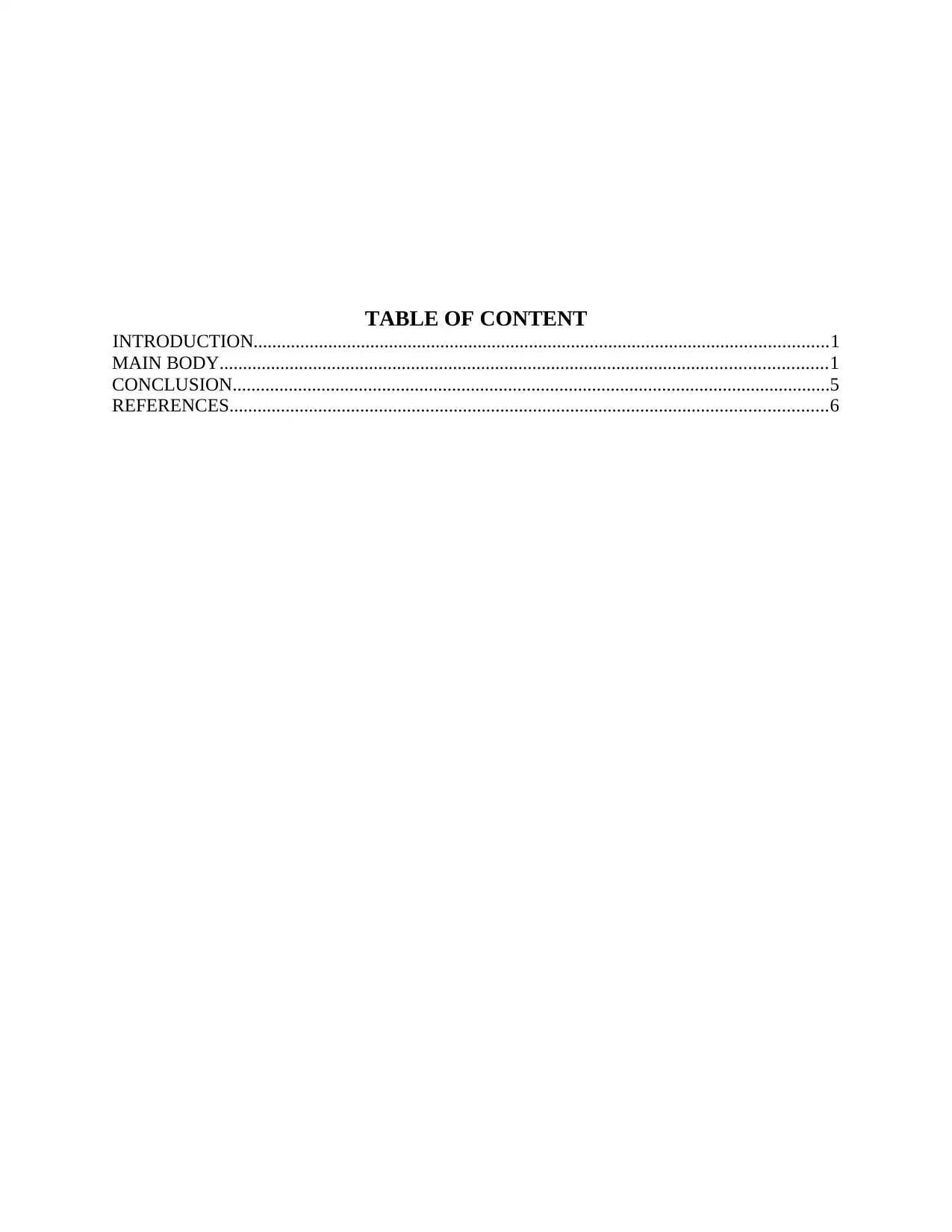
TABLE OF CONTENT
INTRODUCTION...........................................................................................................................1
MAIN BODY..................................................................................................................................1
CONCLUSION................................................................................................................................5
REFERENCES................................................................................................................................6
INTRODUCTION...........................................................................................................................1
MAIN BODY..................................................................................................................................1
CONCLUSION................................................................................................................................5
REFERENCES................................................................................................................................6
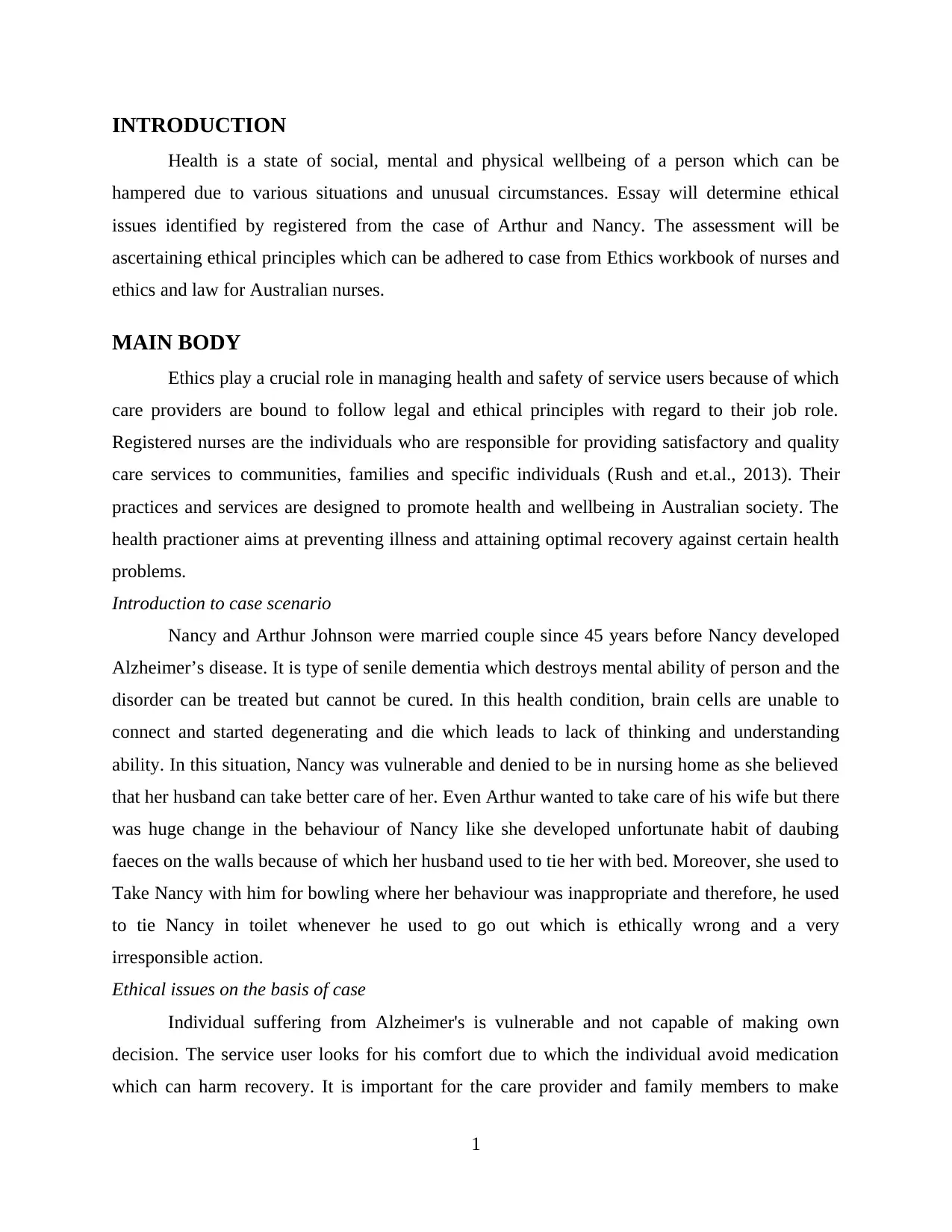
INTRODUCTION
Health is a state of social, mental and physical wellbeing of a person which can be
hampered due to various situations and unusual circumstances. Essay will determine ethical
issues identified by registered from the case of Arthur and Nancy. The assessment will be
ascertaining ethical principles which can be adhered to case from Ethics workbook of nurses and
ethics and law for Australian nurses.
MAIN BODY
Ethics play a crucial role in managing health and safety of service users because of which
care providers are bound to follow legal and ethical principles with regard to their job role.
Registered nurses are the individuals who are responsible for providing satisfactory and quality
care services to communities, families and specific individuals (Rush and et.al., 2013). Their
practices and services are designed to promote health and wellbeing in Australian society. The
health practioner aims at preventing illness and attaining optimal recovery against certain health
problems.
Introduction to case scenario
Nancy and Arthur Johnson were married couple since 45 years before Nancy developed
Alzheimer’s disease. It is type of senile dementia which destroys mental ability of person and the
disorder can be treated but cannot be cured. In this health condition, brain cells are unable to
connect and started degenerating and die which leads to lack of thinking and understanding
ability. In this situation, Nancy was vulnerable and denied to be in nursing home as she believed
that her husband can take better care of her. Even Arthur wanted to take care of his wife but there
was huge change in the behaviour of Nancy like she developed unfortunate habit of daubing
faeces on the walls because of which her husband used to tie her with bed. Moreover, she used to
Take Nancy with him for bowling where her behaviour was inappropriate and therefore, he used
to tie Nancy in toilet whenever he used to go out which is ethically wrong and a very
irresponsible action.
Ethical issues on the basis of case
Individual suffering from Alzheimer's is vulnerable and not capable of making own
decision. The service user looks for his comfort due to which the individual avoid medication
which can harm recovery. It is important for the care provider and family members to make
1
Health is a state of social, mental and physical wellbeing of a person which can be
hampered due to various situations and unusual circumstances. Essay will determine ethical
issues identified by registered from the case of Arthur and Nancy. The assessment will be
ascertaining ethical principles which can be adhered to case from Ethics workbook of nurses and
ethics and law for Australian nurses.
MAIN BODY
Ethics play a crucial role in managing health and safety of service users because of which
care providers are bound to follow legal and ethical principles with regard to their job role.
Registered nurses are the individuals who are responsible for providing satisfactory and quality
care services to communities, families and specific individuals (Rush and et.al., 2013). Their
practices and services are designed to promote health and wellbeing in Australian society. The
health practioner aims at preventing illness and attaining optimal recovery against certain health
problems.
Introduction to case scenario
Nancy and Arthur Johnson were married couple since 45 years before Nancy developed
Alzheimer’s disease. It is type of senile dementia which destroys mental ability of person and the
disorder can be treated but cannot be cured. In this health condition, brain cells are unable to
connect and started degenerating and die which leads to lack of thinking and understanding
ability. In this situation, Nancy was vulnerable and denied to be in nursing home as she believed
that her husband can take better care of her. Even Arthur wanted to take care of his wife but there
was huge change in the behaviour of Nancy like she developed unfortunate habit of daubing
faeces on the walls because of which her husband used to tie her with bed. Moreover, she used to
Take Nancy with him for bowling where her behaviour was inappropriate and therefore, he used
to tie Nancy in toilet whenever he used to go out which is ethically wrong and a very
irresponsible action.
Ethical issues on the basis of case
Individual suffering from Alzheimer's is vulnerable and not capable of making own
decision. The service user looks for his comfort due to which the individual avoid medication
which can harm recovery. It is important for the care provider and family members to make
1
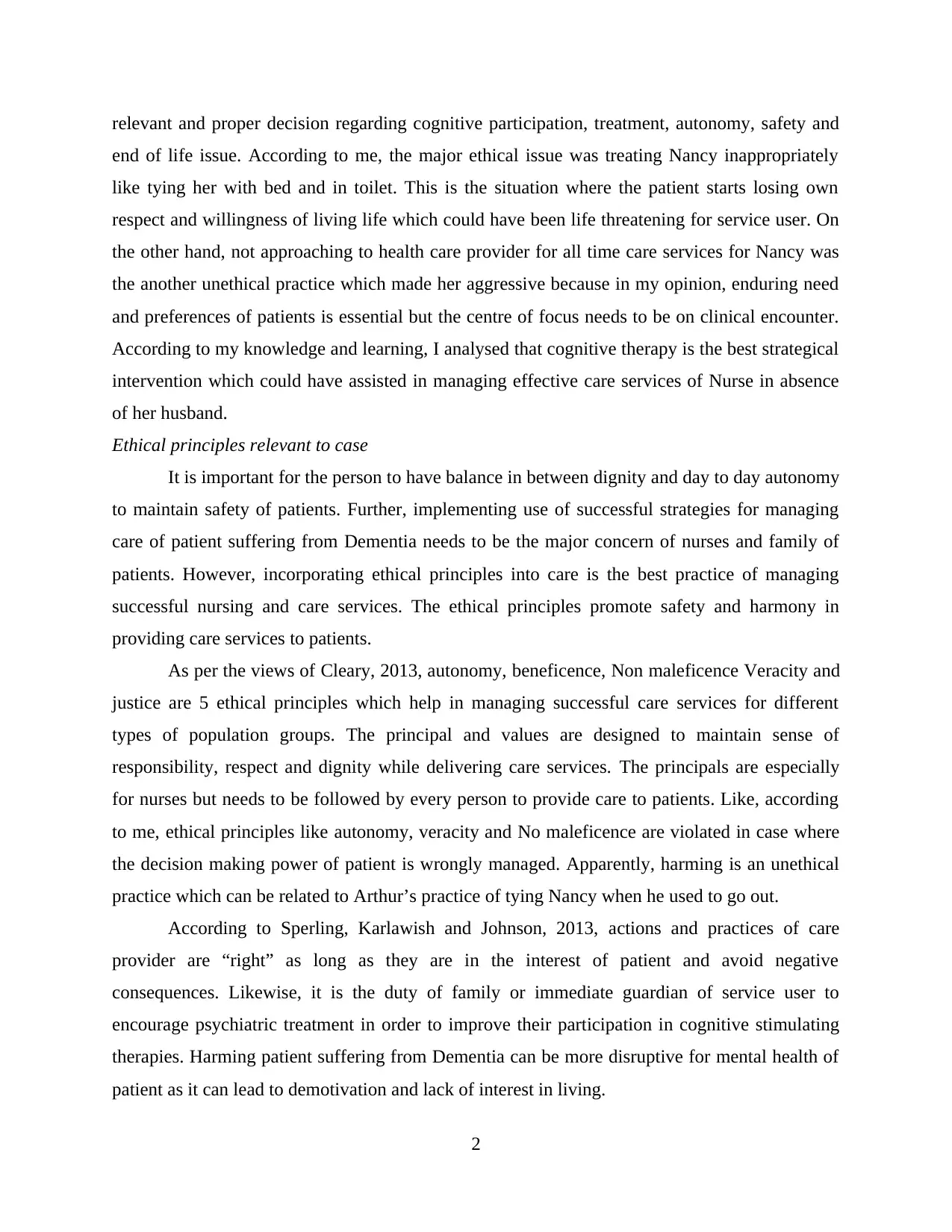
relevant and proper decision regarding cognitive participation, treatment, autonomy, safety and
end of life issue. According to me, the major ethical issue was treating Nancy inappropriately
like tying her with bed and in toilet. This is the situation where the patient starts losing own
respect and willingness of living life which could have been life threatening for service user. On
the other hand, not approaching to health care provider for all time care services for Nancy was
the another unethical practice which made her aggressive because in my opinion, enduring need
and preferences of patients is essential but the centre of focus needs to be on clinical encounter.
According to my knowledge and learning, I analysed that cognitive therapy is the best strategical
intervention which could have assisted in managing effective care services of Nurse in absence
of her husband.
Ethical principles relevant to case
It is important for the person to have balance in between dignity and day to day autonomy
to maintain safety of patients. Further, implementing use of successful strategies for managing
care of patient suffering from Dementia needs to be the major concern of nurses and family of
patients. However, incorporating ethical principles into care is the best practice of managing
successful nursing and care services. The ethical principles promote safety and harmony in
providing care services to patients.
As per the views of Cleary, 2013, autonomy, beneficence, Non maleficence Veracity and
justice are 5 ethical principles which help in managing successful care services for different
types of population groups. The principal and values are designed to maintain sense of
responsibility, respect and dignity while delivering care services. The principals are especially
for nurses but needs to be followed by every person to provide care to patients. Like, according
to me, ethical principles like autonomy, veracity and No maleficence are violated in case where
the decision making power of patient is wrongly managed. Apparently, harming is an unethical
practice which can be related to Arthur’s practice of tying Nancy when he used to go out.
According to Sperling, Karlawish and Johnson, 2013, actions and practices of care
provider are “right” as long as they are in the interest of patient and avoid negative
consequences. Likewise, it is the duty of family or immediate guardian of service user to
encourage psychiatric treatment in order to improve their participation in cognitive stimulating
therapies. Harming patient suffering from Dementia can be more disruptive for mental health of
patient as it can lead to demotivation and lack of interest in living.
2
end of life issue. According to me, the major ethical issue was treating Nancy inappropriately
like tying her with bed and in toilet. This is the situation where the patient starts losing own
respect and willingness of living life which could have been life threatening for service user. On
the other hand, not approaching to health care provider for all time care services for Nancy was
the another unethical practice which made her aggressive because in my opinion, enduring need
and preferences of patients is essential but the centre of focus needs to be on clinical encounter.
According to my knowledge and learning, I analysed that cognitive therapy is the best strategical
intervention which could have assisted in managing effective care services of Nurse in absence
of her husband.
Ethical principles relevant to case
It is important for the person to have balance in between dignity and day to day autonomy
to maintain safety of patients. Further, implementing use of successful strategies for managing
care of patient suffering from Dementia needs to be the major concern of nurses and family of
patients. However, incorporating ethical principles into care is the best practice of managing
successful nursing and care services. The ethical principles promote safety and harmony in
providing care services to patients.
As per the views of Cleary, 2013, autonomy, beneficence, Non maleficence Veracity and
justice are 5 ethical principles which help in managing successful care services for different
types of population groups. The principal and values are designed to maintain sense of
responsibility, respect and dignity while delivering care services. The principals are especially
for nurses but needs to be followed by every person to provide care to patients. Like, according
to me, ethical principles like autonomy, veracity and No maleficence are violated in case where
the decision making power of patient is wrongly managed. Apparently, harming is an unethical
practice which can be related to Arthur’s practice of tying Nancy when he used to go out.
According to Sperling, Karlawish and Johnson, 2013, actions and practices of care
provider are “right” as long as they are in the interest of patient and avoid negative
consequences. Likewise, it is the duty of family or immediate guardian of service user to
encourage psychiatric treatment in order to improve their participation in cognitive stimulating
therapies. Harming patient suffering from Dementia can be more disruptive for mental health of
patient as it can lead to demotivation and lack of interest in living.
2
Secure Best Marks with AI Grader
Need help grading? Try our AI Grader for instant feedback on your assignments.
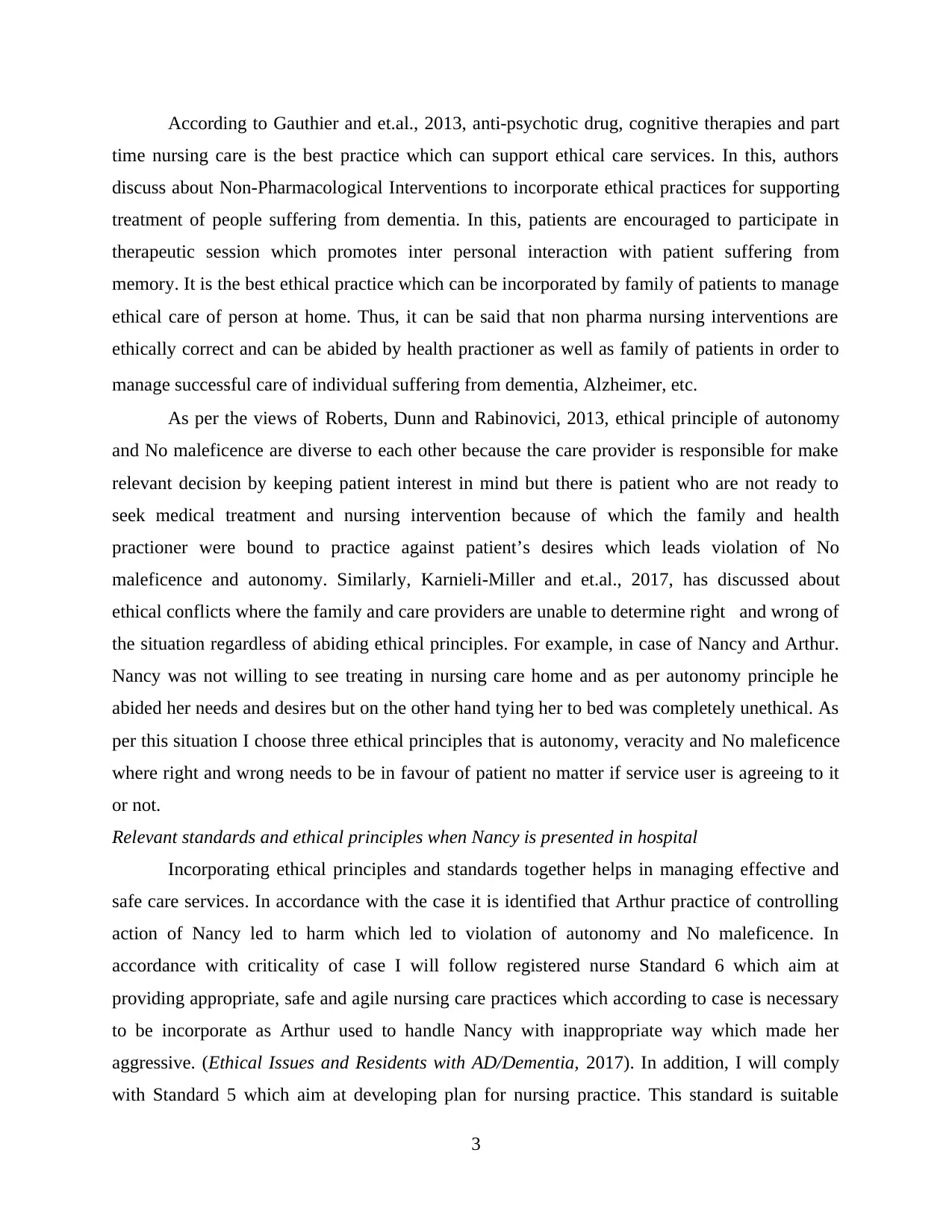
According to Gauthier and et.al., 2013, anti-psychotic drug, cognitive therapies and part
time nursing care is the best practice which can support ethical care services. In this, authors
discuss about Non-Pharmacological Interventions to incorporate ethical practices for supporting
treatment of people suffering from dementia. In this, patients are encouraged to participate in
therapeutic session which promotes inter personal interaction with patient suffering from
memory. It is the best ethical practice which can be incorporated by family of patients to manage
ethical care of person at home. Thus, it can be said that non pharma nursing interventions are
ethically correct and can be abided by health practioner as well as family of patients in order to
manage successful care of individual suffering from dementia, Alzheimer, etc.
As per the views of Roberts, Dunn and Rabinovici, 2013, ethical principle of autonomy
and No maleficence are diverse to each other because the care provider is responsible for make
relevant decision by keeping patient interest in mind but there is patient who are not ready to
seek medical treatment and nursing intervention because of which the family and health
practioner were bound to practice against patient’s desires which leads violation of No
maleficence and autonomy. Similarly, Karnieli-Miller and et.al., 2017, has discussed about
ethical conflicts where the family and care providers are unable to determine right and wrong of
the situation regardless of abiding ethical principles. For example, in case of Nancy and Arthur.
Nancy was not willing to see treating in nursing care home and as per autonomy principle he
abided her needs and desires but on the other hand tying her to bed was completely unethical. As
per this situation I choose three ethical principles that is autonomy, veracity and No maleficence
where right and wrong needs to be in favour of patient no matter if service user is agreeing to it
or not.
Relevant standards and ethical principles when Nancy is presented in hospital
Incorporating ethical principles and standards together helps in managing effective and
safe care services. In accordance with the case it is identified that Arthur practice of controlling
action of Nancy led to harm which led to violation of autonomy and No maleficence. In
accordance with criticality of case I will follow registered nurse Standard 6 which aim at
providing appropriate, safe and agile nursing care practices which according to case is necessary
to be incorporate as Arthur used to handle Nancy with inappropriate way which made her
aggressive. (Ethical Issues and Residents with AD/Dementia, 2017). In addition, I will comply
with Standard 5 which aim at developing plan for nursing practice. This standard is suitable
3
time nursing care is the best practice which can support ethical care services. In this, authors
discuss about Non-Pharmacological Interventions to incorporate ethical practices for supporting
treatment of people suffering from dementia. In this, patients are encouraged to participate in
therapeutic session which promotes inter personal interaction with patient suffering from
memory. It is the best ethical practice which can be incorporated by family of patients to manage
ethical care of person at home. Thus, it can be said that non pharma nursing interventions are
ethically correct and can be abided by health practioner as well as family of patients in order to
manage successful care of individual suffering from dementia, Alzheimer, etc.
As per the views of Roberts, Dunn and Rabinovici, 2013, ethical principle of autonomy
and No maleficence are diverse to each other because the care provider is responsible for make
relevant decision by keeping patient interest in mind but there is patient who are not ready to
seek medical treatment and nursing intervention because of which the family and health
practioner were bound to practice against patient’s desires which leads violation of No
maleficence and autonomy. Similarly, Karnieli-Miller and et.al., 2017, has discussed about
ethical conflicts where the family and care providers are unable to determine right and wrong of
the situation regardless of abiding ethical principles. For example, in case of Nancy and Arthur.
Nancy was not willing to see treating in nursing care home and as per autonomy principle he
abided her needs and desires but on the other hand tying her to bed was completely unethical. As
per this situation I choose three ethical principles that is autonomy, veracity and No maleficence
where right and wrong needs to be in favour of patient no matter if service user is agreeing to it
or not.
Relevant standards and ethical principles when Nancy is presented in hospital
Incorporating ethical principles and standards together helps in managing effective and
safe care services. In accordance with the case it is identified that Arthur practice of controlling
action of Nancy led to harm which led to violation of autonomy and No maleficence. In
accordance with criticality of case I will follow registered nurse Standard 6 which aim at
providing appropriate, safe and agile nursing care practices which according to case is necessary
to be incorporate as Arthur used to handle Nancy with inappropriate way which made her
aggressive. (Ethical Issues and Residents with AD/Dementia, 2017). In addition, I will comply
with Standard 5 which aim at developing plan for nursing practice. This standard is suitable
3
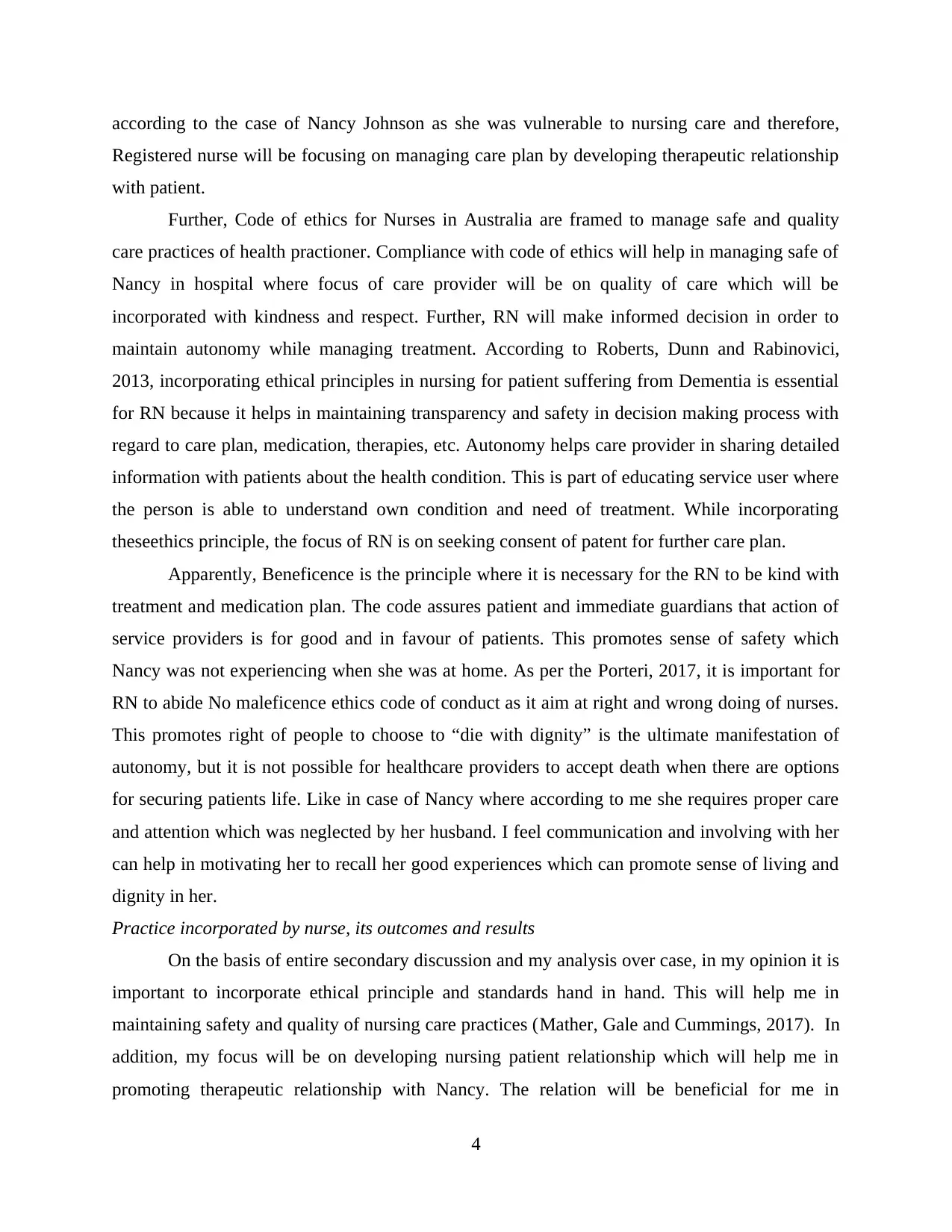
according to the case of Nancy Johnson as she was vulnerable to nursing care and therefore,
Registered nurse will be focusing on managing care plan by developing therapeutic relationship
with patient.
Further, Code of ethics for Nurses in Australia are framed to manage safe and quality
care practices of health practioner. Compliance with code of ethics will help in managing safe of
Nancy in hospital where focus of care provider will be on quality of care which will be
incorporated with kindness and respect. Further, RN will make informed decision in order to
maintain autonomy while managing treatment. According to Roberts, Dunn and Rabinovici,
2013, incorporating ethical principles in nursing for patient suffering from Dementia is essential
for RN because it helps in maintaining transparency and safety in decision making process with
regard to care plan, medication, therapies, etc. Autonomy helps care provider in sharing detailed
information with patients about the health condition. This is part of educating service user where
the person is able to understand own condition and need of treatment. While incorporating
theseethics principle, the focus of RN is on seeking consent of patent for further care plan.
Apparently, Beneficence is the principle where it is necessary for the RN to be kind with
treatment and medication plan. The code assures patient and immediate guardians that action of
service providers is for good and in favour of patients. This promotes sense of safety which
Nancy was not experiencing when she was at home. As per the Porteri, 2017, it is important for
RN to abide No maleficence ethics code of conduct as it aim at right and wrong doing of nurses.
This promotes right of people to choose to “die with dignity” is the ultimate manifestation of
autonomy, but it is not possible for healthcare providers to accept death when there are options
for securing patients life. Like in case of Nancy where according to me she requires proper care
and attention which was neglected by her husband. I feel communication and involving with her
can help in motivating her to recall her good experiences which can promote sense of living and
dignity in her.
Practice incorporated by nurse, its outcomes and results
On the basis of entire secondary discussion and my analysis over case, in my opinion it is
important to incorporate ethical principle and standards hand in hand. This will help me in
maintaining safety and quality of nursing care practices (Mather, Gale and Cummings, 2017). In
addition, my focus will be on developing nursing patient relationship which will help me in
promoting therapeutic relationship with Nancy. The relation will be beneficial for me in
4
Registered nurse will be focusing on managing care plan by developing therapeutic relationship
with patient.
Further, Code of ethics for Nurses in Australia are framed to manage safe and quality
care practices of health practioner. Compliance with code of ethics will help in managing safe of
Nancy in hospital where focus of care provider will be on quality of care which will be
incorporated with kindness and respect. Further, RN will make informed decision in order to
maintain autonomy while managing treatment. According to Roberts, Dunn and Rabinovici,
2013, incorporating ethical principles in nursing for patient suffering from Dementia is essential
for RN because it helps in maintaining transparency and safety in decision making process with
regard to care plan, medication, therapies, etc. Autonomy helps care provider in sharing detailed
information with patients about the health condition. This is part of educating service user where
the person is able to understand own condition and need of treatment. While incorporating
theseethics principle, the focus of RN is on seeking consent of patent for further care plan.
Apparently, Beneficence is the principle where it is necessary for the RN to be kind with
treatment and medication plan. The code assures patient and immediate guardians that action of
service providers is for good and in favour of patients. This promotes sense of safety which
Nancy was not experiencing when she was at home. As per the Porteri, 2017, it is important for
RN to abide No maleficence ethics code of conduct as it aim at right and wrong doing of nurses.
This promotes right of people to choose to “die with dignity” is the ultimate manifestation of
autonomy, but it is not possible for healthcare providers to accept death when there are options
for securing patients life. Like in case of Nancy where according to me she requires proper care
and attention which was neglected by her husband. I feel communication and involving with her
can help in motivating her to recall her good experiences which can promote sense of living and
dignity in her.
Practice incorporated by nurse, its outcomes and results
On the basis of entire secondary discussion and my analysis over case, in my opinion it is
important to incorporate ethical principle and standards hand in hand. This will help me in
maintaining safety and quality of nursing care practices (Mather, Gale and Cummings, 2017). In
addition, my focus will be on developing nursing patient relationship which will help me in
promoting therapeutic relationship with Nancy. The relation will be beneficial for me in
4
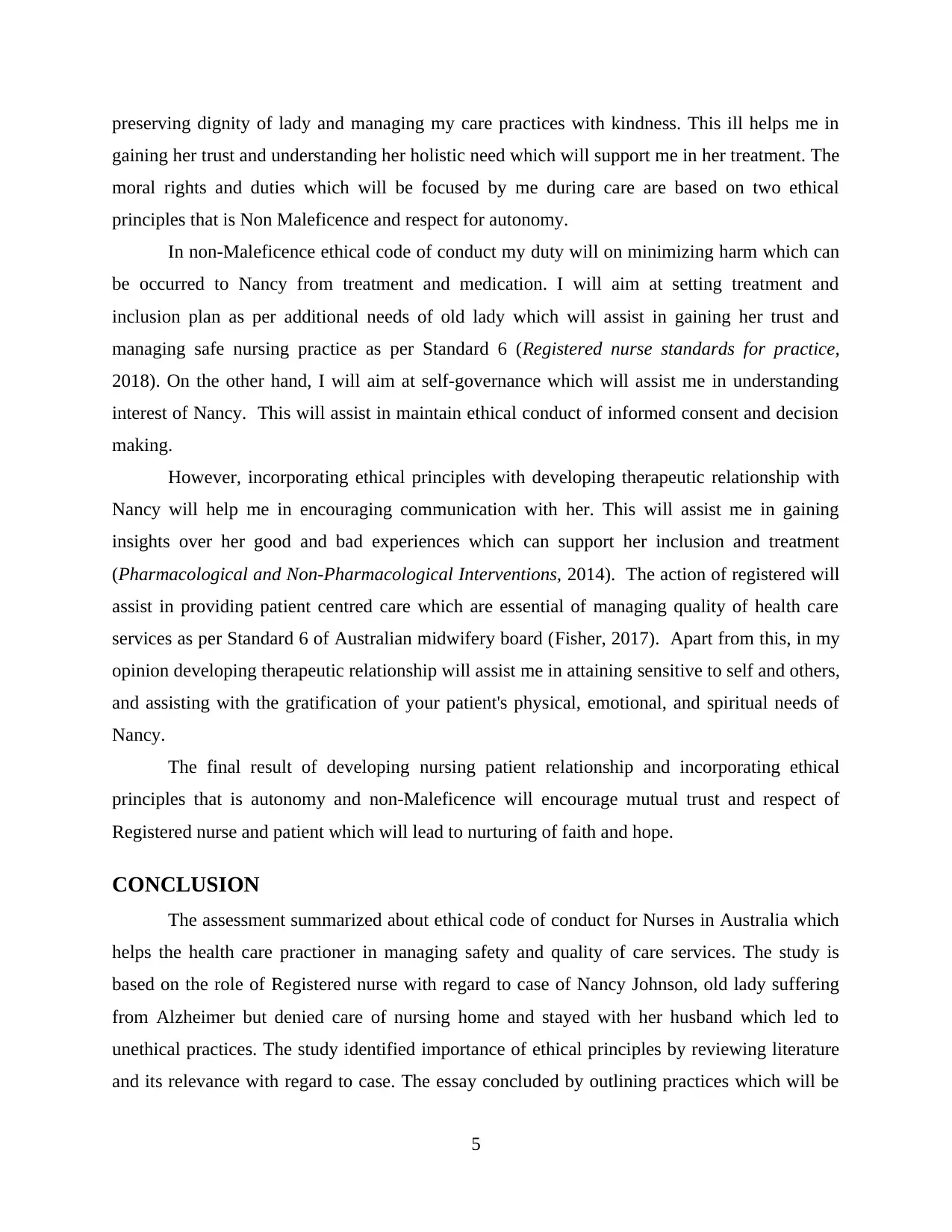
preserving dignity of lady and managing my care practices with kindness. This ill helps me in
gaining her trust and understanding her holistic need which will support me in her treatment. The
moral rights and duties which will be focused by me during care are based on two ethical
principles that is Non Maleficence and respect for autonomy.
In non-Maleficence ethical code of conduct my duty will on minimizing harm which can
be occurred to Nancy from treatment and medication. I will aim at setting treatment and
inclusion plan as per additional needs of old lady which will assist in gaining her trust and
managing safe nursing practice as per Standard 6 (Registered nurse standards for practice,
2018). On the other hand, I will aim at self-governance which will assist me in understanding
interest of Nancy. This will assist in maintain ethical conduct of informed consent and decision
making.
However, incorporating ethical principles with developing therapeutic relationship with
Nancy will help me in encouraging communication with her. This will assist me in gaining
insights over her good and bad experiences which can support her inclusion and treatment
(Pharmacological and Non-Pharmacological Interventions, 2014). The action of registered will
assist in providing patient centred care which are essential of managing quality of health care
services as per Standard 6 of Australian midwifery board (Fisher, 2017). Apart from this, in my
opinion developing therapeutic relationship will assist me in attaining sensitive to self and others,
and assisting with the gratification of your patient's physical, emotional, and spiritual needs of
Nancy.
The final result of developing nursing patient relationship and incorporating ethical
principles that is autonomy and non-Maleficence will encourage mutual trust and respect of
Registered nurse and patient which will lead to nurturing of faith and hope.
CONCLUSION
The assessment summarized about ethical code of conduct for Nurses in Australia which
helps the health care practioner in managing safety and quality of care services. The study is
based on the role of Registered nurse with regard to case of Nancy Johnson, old lady suffering
from Alzheimer but denied care of nursing home and stayed with her husband which led to
unethical practices. The study identified importance of ethical principles by reviewing literature
and its relevance with regard to case. The essay concluded by outlining practices which will be
5
gaining her trust and understanding her holistic need which will support me in her treatment. The
moral rights and duties which will be focused by me during care are based on two ethical
principles that is Non Maleficence and respect for autonomy.
In non-Maleficence ethical code of conduct my duty will on minimizing harm which can
be occurred to Nancy from treatment and medication. I will aim at setting treatment and
inclusion plan as per additional needs of old lady which will assist in gaining her trust and
managing safe nursing practice as per Standard 6 (Registered nurse standards for practice,
2018). On the other hand, I will aim at self-governance which will assist me in understanding
interest of Nancy. This will assist in maintain ethical conduct of informed consent and decision
making.
However, incorporating ethical principles with developing therapeutic relationship with
Nancy will help me in encouraging communication with her. This will assist me in gaining
insights over her good and bad experiences which can support her inclusion and treatment
(Pharmacological and Non-Pharmacological Interventions, 2014). The action of registered will
assist in providing patient centred care which are essential of managing quality of health care
services as per Standard 6 of Australian midwifery board (Fisher, 2017). Apart from this, in my
opinion developing therapeutic relationship will assist me in attaining sensitive to self and others,
and assisting with the gratification of your patient's physical, emotional, and spiritual needs of
Nancy.
The final result of developing nursing patient relationship and incorporating ethical
principles that is autonomy and non-Maleficence will encourage mutual trust and respect of
Registered nurse and patient which will lead to nurturing of faith and hope.
CONCLUSION
The assessment summarized about ethical code of conduct for Nurses in Australia which
helps the health care practioner in managing safety and quality of care services. The study is
based on the role of Registered nurse with regard to case of Nancy Johnson, old lady suffering
from Alzheimer but denied care of nursing home and stayed with her husband which led to
unethical practices. The study identified importance of ethical principles by reviewing literature
and its relevance with regard to case. The essay concluded by outlining practices which will be
5
Paraphrase This Document
Need a fresh take? Get an instant paraphrase of this document with our AI Paraphraser

incorporated by nurses to derive positive outcomes of case by complying with Australian nursing
standards and code of ethics.
6
standards and code of ethics.
6
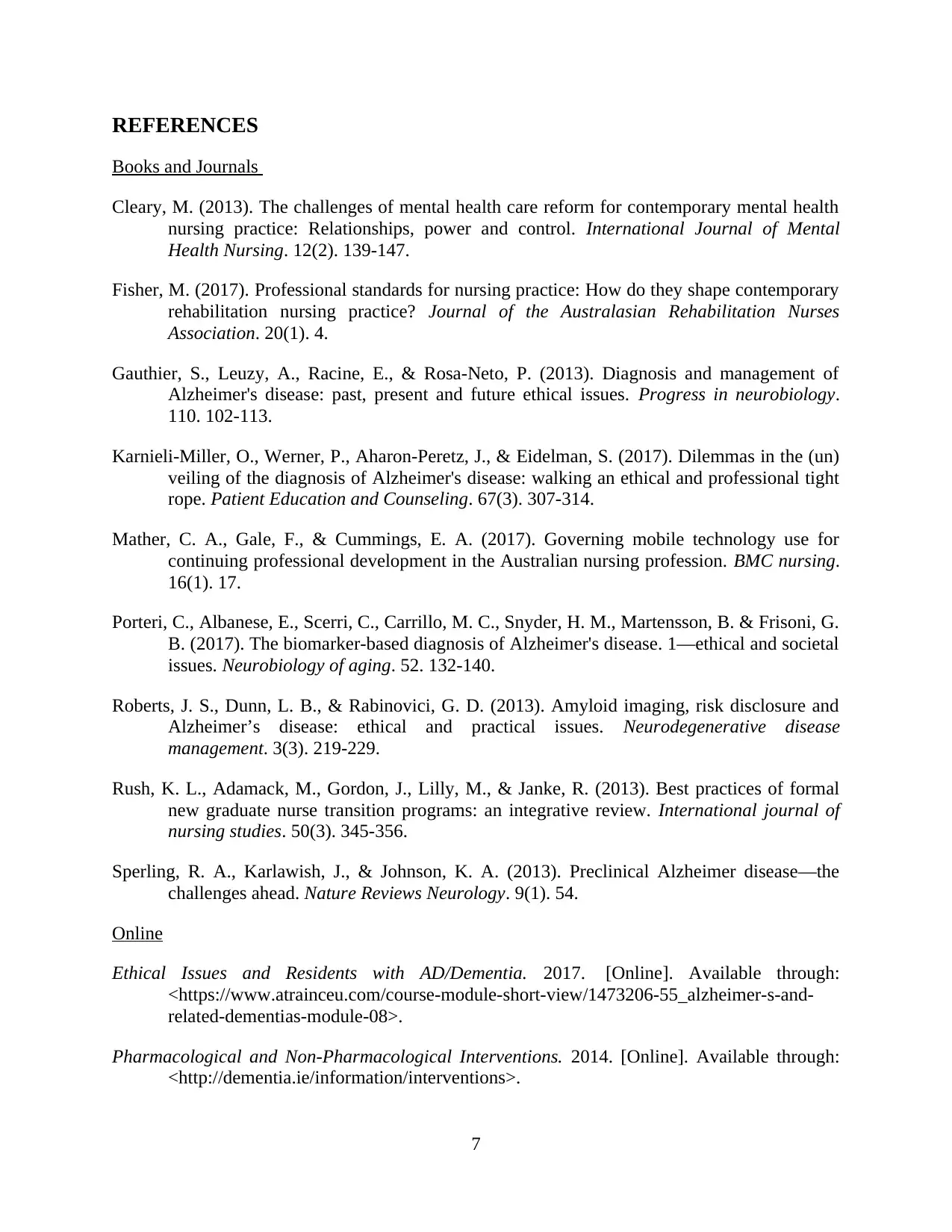
REFERENCES
Books and Journals
Cleary, M. (2013). The challenges of mental health care reform for contemporary mental health
nursing practice: Relationships, power and control. International Journal of Mental
Health Nursing. 12(2). 139-147.
Fisher, M. (2017). Professional standards for nursing practice: How do they shape contemporary
rehabilitation nursing practice? Journal of the Australasian Rehabilitation Nurses
Association. 20(1). 4.
Gauthier, S., Leuzy, A., Racine, E., & Rosa-Neto, P. (2013). Diagnosis and management of
Alzheimer's disease: past, present and future ethical issues. Progress in neurobiology.
110. 102-113.
Karnieli-Miller, O., Werner, P., Aharon-Peretz, J., & Eidelman, S. (2017). Dilemmas in the (un)
veiling of the diagnosis of Alzheimer's disease: walking an ethical and professional tight
rope. Patient Education and Counseling. 67(3). 307-314.
Mather, C. A., Gale, F., & Cummings, E. A. (2017). Governing mobile technology use for
continuing professional development in the Australian nursing profession. BMC nursing.
16(1). 17.
Porteri, C., Albanese, E., Scerri, C., Carrillo, M. C., Snyder, H. M., Martensson, B. & Frisoni, G.
B. (2017). The biomarker-based diagnosis of Alzheimer's disease. 1—ethical and societal
issues. Neurobiology of aging. 52. 132-140.
Roberts, J. S., Dunn, L. B., & Rabinovici, G. D. (2013). Amyloid imaging, risk disclosure and
Alzheimer’s disease: ethical and practical issues. Neurodegenerative disease
management. 3(3). 219-229.
Rush, K. L., Adamack, M., Gordon, J., Lilly, M., & Janke, R. (2013). Best practices of formal
new graduate nurse transition programs: an integrative review. International journal of
nursing studies. 50(3). 345-356.
Sperling, R. A., Karlawish, J., & Johnson, K. A. (2013). Preclinical Alzheimer disease—the
challenges ahead. Nature Reviews Neurology. 9(1). 54.
Online
Ethical Issues and Residents with AD/Dementia. 2017. [Online]. Available through:
<https://www.atrainceu.com/course-module-short-view/1473206-55_alzheimer-s-and-
related-dementias-module-08>.
Pharmacological and Non-Pharmacological Interventions. 2014. [Online]. Available through:
<http://dementia.ie/information/interventions>.
7
Books and Journals
Cleary, M. (2013). The challenges of mental health care reform for contemporary mental health
nursing practice: Relationships, power and control. International Journal of Mental
Health Nursing. 12(2). 139-147.
Fisher, M. (2017). Professional standards for nursing practice: How do they shape contemporary
rehabilitation nursing practice? Journal of the Australasian Rehabilitation Nurses
Association. 20(1). 4.
Gauthier, S., Leuzy, A., Racine, E., & Rosa-Neto, P. (2013). Diagnosis and management of
Alzheimer's disease: past, present and future ethical issues. Progress in neurobiology.
110. 102-113.
Karnieli-Miller, O., Werner, P., Aharon-Peretz, J., & Eidelman, S. (2017). Dilemmas in the (un)
veiling of the diagnosis of Alzheimer's disease: walking an ethical and professional tight
rope. Patient Education and Counseling. 67(3). 307-314.
Mather, C. A., Gale, F., & Cummings, E. A. (2017). Governing mobile technology use for
continuing professional development in the Australian nursing profession. BMC nursing.
16(1). 17.
Porteri, C., Albanese, E., Scerri, C., Carrillo, M. C., Snyder, H. M., Martensson, B. & Frisoni, G.
B. (2017). The biomarker-based diagnosis of Alzheimer's disease. 1—ethical and societal
issues. Neurobiology of aging. 52. 132-140.
Roberts, J. S., Dunn, L. B., & Rabinovici, G. D. (2013). Amyloid imaging, risk disclosure and
Alzheimer’s disease: ethical and practical issues. Neurodegenerative disease
management. 3(3). 219-229.
Rush, K. L., Adamack, M., Gordon, J., Lilly, M., & Janke, R. (2013). Best practices of formal
new graduate nurse transition programs: an integrative review. International journal of
nursing studies. 50(3). 345-356.
Sperling, R. A., Karlawish, J., & Johnson, K. A. (2013). Preclinical Alzheimer disease—the
challenges ahead. Nature Reviews Neurology. 9(1). 54.
Online
Ethical Issues and Residents with AD/Dementia. 2017. [Online]. Available through:
<https://www.atrainceu.com/course-module-short-view/1473206-55_alzheimer-s-and-
related-dementias-module-08>.
Pharmacological and Non-Pharmacological Interventions. 2014. [Online]. Available through:
<http://dementia.ie/information/interventions>.
7
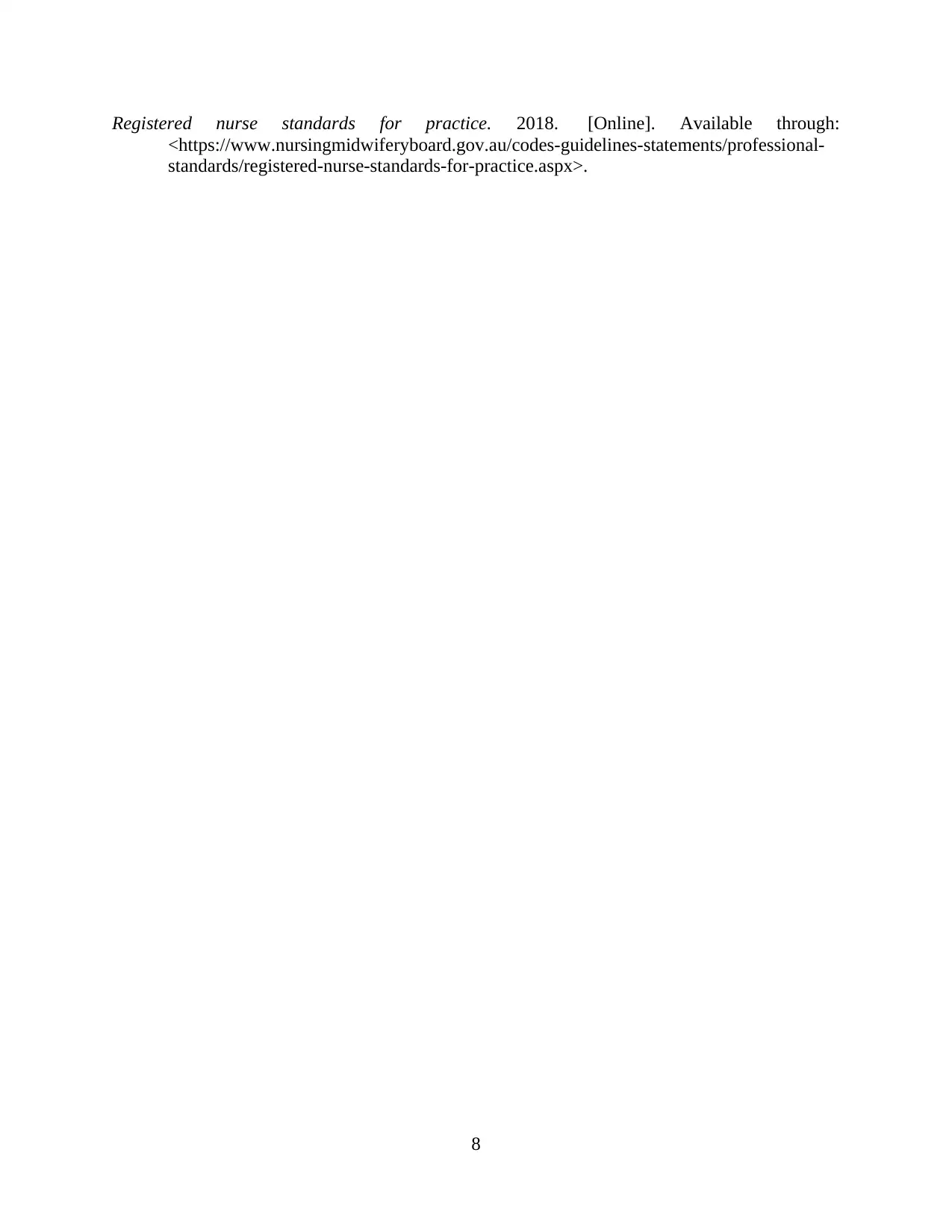
Registered nurse standards for practice. 2018. [Online]. Available through:
<https://www.nursingmidwiferyboard.gov.au/codes-guidelines-statements/professional-
standards/registered-nurse-standards-for-practice.aspx>.
8
<https://www.nursingmidwiferyboard.gov.au/codes-guidelines-statements/professional-
standards/registered-nurse-standards-for-practice.aspx>.
8
1 out of 10
Your All-in-One AI-Powered Toolkit for Academic Success.
+13062052269
info@desklib.com
Available 24*7 on WhatsApp / Email
![[object Object]](/_next/static/media/star-bottom.7253800d.svg)
Unlock your academic potential
© 2024 | Zucol Services PVT LTD | All rights reserved.





